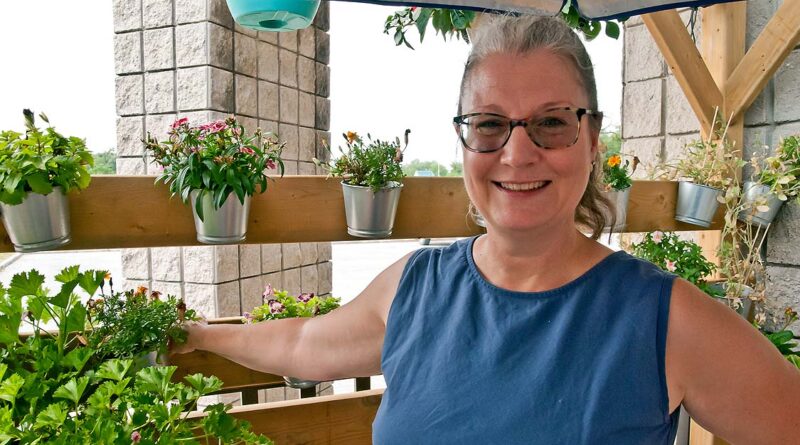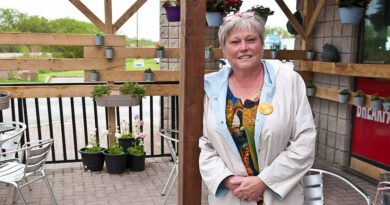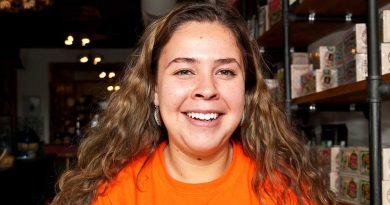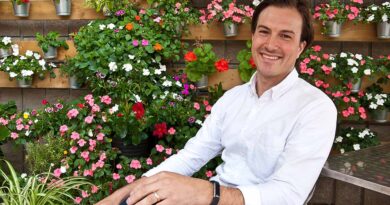Janet-Lynne Durnford: Right The Wrongs
SUNonline/Orillia profiles candidates from each party in the forthcoming federal election.
By John Swartz
Janet Lynne Durnford, a Grade 5 teacher at Monsignor Lee Catholic School and the NDP candidate is making her second political foray in this election. She put her name forward in 2019 for the party’s candidacy, but bowed out as the election period began.
‘It was really important to me that I run a campaign I could put my all into and it just got to a point where I didn’t feel like I could, the times were getting short. Of course, with this election we have 36 days. Today is E minus 29,” she laughed.
The issue was the party’s process of qualifying nominees taking too long and she felt she couldn’t be effective with a late start on the trail. This time however, she read the tea leaves ad started he nomination process some months ago.
“It was a struggle last time, but this time is was very smooth sailing, the party was very fair to me. I’m really grateful to have made it through vetting. I’m thankful to the party for how rigorous their vetting process is.”
Durnford, born in Sudbury, lived briefly in Anten Mills, and has lived most of her life in Orillia. She graduated from Park Street Collegiate where she met her husband, Max.
“We met during International Youth Year. We were on a committee together that was planning International Youth Year events,” she said. Her family includes, “three dogs, no cat, the cat sadly passed, two birds and five adults in the house because of COVID,”
She continued studies in Kitchener/Waterloo. One of her fields of study would turn out to have more relevance today than she thought.
“I took a year off and was a bank teller for a year and then I went to Wilfred Laurier and the University of Waterloo and did a bachelor of honours English and minor in religion. All my religion courses ended up being about Indigenous religions. I don’t really know how and why Lauier was offering that at the time, but it was fascinating. I’m so glad I have that background,” said Durnford.
An always interesting question is what motivates a candidate to become a standard bearer for a particular party.
“I have never, until now, been a partisan. I have always been politically interested, but kind of discriminately non-partisan. I have voted many different ways. Then in 2018 I saw a video of Jagmeet Singh and I was so impressed with him. I went to the party website, read the platform and realized everything that was in the platform and was in their policy document aligned with my own beliefs. It’s been a big leap. I had friends who were angry with me for choosing a party because I always tried to look at all sides of the issues,” Durnford said. Of course, not every party plank is perfect for everyone and Durnford thinks NDP party polices appeal to many people, including other parties, yet it doesn’t translate into votes.
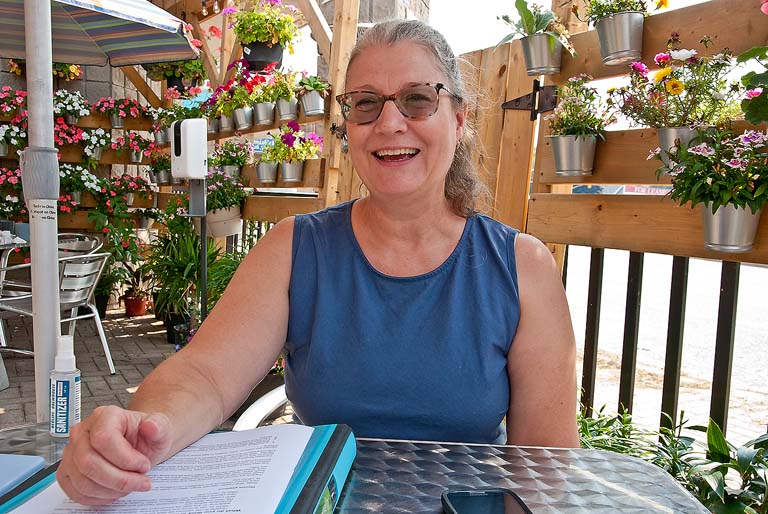
“I hope there is better recognition for the party. They’ve kind of had third party status for a long time. I think this election and the past couple of years with Jagmeet’sleadership they showed they are not just a third party. I think the leadership under Jagmeet is one of the strongest things the party has going for it,” she said.
“I don’t think there’s anything in there I vehemently disagree with. Fiscal policy, at this point it’s quite a brief section of the commitments document and I hope the commitments can be costed before the end of the election period. I think that’s something that’s really important because people very rightly ask – how are you going to pay for things? I know Jagmeet’s answer and it’s a direct answer which is a wealth tax and a luxury goods tax and close some of those loopholes. I think it’s something people want to see costed and I respect that. That’s something that could and should be done and hopefully is being done. I know the last platform was costed, but its process.”
An important quality voters should take into account more often is how candidates learn about details they are expected to know, and how they gather information which might affect how they vote on an issue.
“I’m always asking myself and checking the information is reliable. I start with the internet. There’s a lot of people that have lost faith in so-called mainstream media. I am not one of those people. I respect journalism. I think a free and open, unbiased media is essential to our culture. I often start with the CBC. Every different media has slightly different slant, so I’ll check out CBC, National Post, Toronto Star, all the big outlets,” she said.
“Talking to people too. Getting in touch with people who are on the ground, involved in issues, getting their opinions. That’s a long process we don’t have time for in this election, but looking up as much as I can, making sure it’s from a reliable source; going back to the science. When it comes to vaccines and COVID we have to go back to the experts and I am not someone who is anti-intellectual. The experts are experts because they spent their lives studying something and they know better than I do as a layperson. I trust the information coming from experts. I know there’s always fringe experts, so –called experts. I think it’s important that people are media literate and we look at the sources.”
One of the hot issues before the election, but not much of a topic now is the Truth and Reconciliation’s 94 Calls to Action, specifically the residential schools issue. In conversation she realized learning about residential schools wasn’t part of her education – even in a course of study which focused on Native religion.
“Even the courses I took in university which were Indigenous focused didn’t talk about them because we were more speaking about Indigenous religions and history,” Durnford said.
“My parents had friends who were Indigenous and I grew up going to Pow Wows and things like that, so I had early exposure to the culture, but also I didn’t know about residential schools until I was a young adult. I remember I was in a circle and Mark Douglas was speaking and he was talking about residential schools and I had never heard of them. I remember crying and being so embarrassed because it was so public. It was just a failure in our education system for so long, so I really tried to mitigate that as a teacher and I’m grateful it’s in the curriculum now. (There) needs to be more focus in the curriculum.”
COVID
One of the interesting things about this election is each party’s position about what we should do next. Equally important is the question of how have we done so far, an aspect that isn’t quite as prominent a topic, yet has great effect on the what’s next factor.
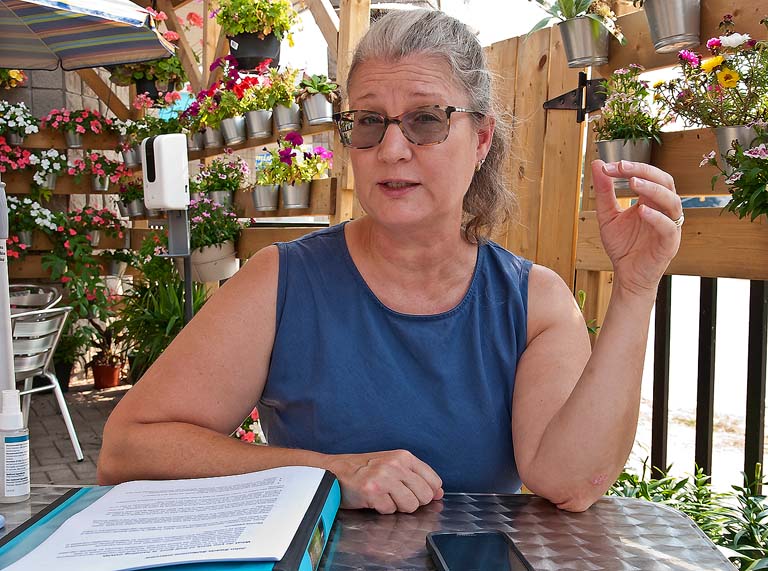
“I’m really grateful we have vaccines and that we have as many of them as we have and we got them early. Now that we have a good supply that Canada is going to ensure other countries that don’t have vaccines, they can have some of our supply. I thought the communication from the top down from the government was not bad and I thought they did a good job of listening to the experts; I’m talking federally, not necessarily provincially. I think it could have been far worse. I think the percentage of people who are vaccinated shows that and our numbers show that, it could have been worse; we’re not Brazil, we’re not Florida,” she said.
“I think the federal government should have taken a leadership on a vaccine passport, whatever you want to call it; it needs to be federal and it should have been done earlier. I think that’s a tremendous lack of leadership. It really could be worked into our existing passport. There needs to be a universal and simple way for people to demonstrate their vaccine status when they are travelling and when they come to private business that are enforcing vaccines, and for work. I think the Liberal government was very slow in setting hard deadlines for ensuring federally regulated businesses, that employees need to have vaccines and we’re really late to ensure healthcare workers and education workers have vaccines too. I know those two things are provincial, but its leadership that should have come from federal to ensure provinces were taking those steps.”
Canadians put great financial resources into dealing with the pandemic, from early research, to development of a vaccine and in August the government weighed more investment to finance vaccine research manufacturing capacity for Moderna. Last month Reuters revealed both Moderna and Pfizer have sales on the books into 2022 of $60 billion, so there are questions about how much do we allow private enterprise to rely on public funds to make profits and how do we limit exposure to hijacking our treasury. Profiteering doesn’t end there, both companies raised vaccine prices in August.
“Oh I missed that one. Really? Per vaccine? It’s my understanding and I would need to fact–check this, but there have been two Canadian companies who wanted to developed vaccines here in Canada who were unable to secure the funding from the Liberal government and ended up going somewhere else. That shouldn’t happen. Why are we giving millions of dollars to these pharmacy giants instead of funding small Canadian based companies who are going to use the same technology. That’s where the money should be going. We absolutely need made in Canada vaccine facilities. We have to have that, the pandemic proves that. I think it can be done using Canadian brains, Canadian money, and Canadian facilities and not bringing in these multi-nationals.”
The ball is not in our court. We need what they have and there are other places to sell what they have. It’s an issue that goes beyond COVID. For example, other commodities, oil by-products, communications and banking services, regaining lost manufacturing capacity are not luxuries and there is no transparency between the cost of manufacturing and retail prices we all pay – and there is nothing on the books to ensure we are not being taken to the cleaners.
“It’s like they are holding us hostage. That is something I need to learn more about. Not only are these multi-national corporations not paying their fair share of taxes, but if they are taking funds from the government and passing costs along to the consumer; I’m thinking of Zher’s too, (they) took all that money for refrigerators as they are making record profits. There have to be controls on that,” said Durnford.
“I know that is a (platform point) to appoint somebody to investigate the corporations that took COVID relief money, gave it to their supports and instead of passing it along to the consumer and getting that money back, that is a commitment in the policy manual. That’s shameful. Meanwhile I know three people who are moving into their parent’s houses, grown adults who have lived independently. My own kids are back living in my house because there is such a shortage of housing.”
“There were not enough checks and balances on that system. I’m grateful for CERB, I’m grateful for funding for small business, but there is no way millions of dollars should have gone to large corporations to go to their board members and their CEOs.”
No one could accuse the government of being oblivious to giving away money to those who don’t deserve it. But their effort seems to be only about clawing back funds after changing rules people previously honestly applied for, yet little is being said about large corporations taking money and then using it for different purposes.
“They’re taking back money from small business. They’ve sent small business invoices saying, oops, we paid you be accident, you need to pay that back. That should be happening on the larger level too.”
Policing
An issue SUNonline/Orillia raised with each candidate is the matter of policing. At the time the interview structure was developed many were questioning the institutional attitude displayed in our criminal justice practices, but during the campaign it’s not one of the hot button issues. Given the continuing parade of headlines it will come back to the fore again and it’s important to know each candidate’s position.
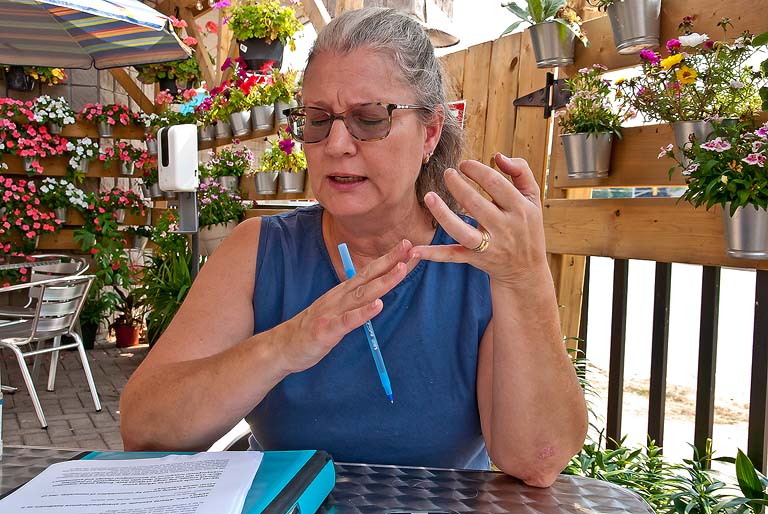
“Statistics show Black, Indegenous and people of colour are way over represented. There’s that systemic racism” Durnford said. “I know one of the promises Jagmeet has made is enforcing a civilian oversight of the RCMP, so when these accusations are made that it’s not the police investigating the police.”
“We need training and re-training from the top down to end that institutional injustice, without question. It has to go further I think, there has to be healing and reconciliation between Indigenous groups,” Durnford said, mentioning the Starlight Tours. “And we know the problem of Indigenous women and children who there were barely any investigations for because they were Indigenous, that’s more than re-training. There need to be acts of restorative justice and healing.”
What seems obvious to many is the rules for thee application of police practice, and when some officers step over the line a distinct lack of accountability.
“My kids say the cruelty is the point; it’s built into the system. It’s very interesting for me because in my household we weren’t even allowed to use the word cop, it had to be police because we were raised with respect for the police and my kids are growing up in an entirely different world because what’s actually happening is showing to them they don’t have respect for the police as an institution because the cruelty is the point.”
It’s not like there aren’t regulations governing the conduct of police, but the action when it comes to discipline is not reflective of the ink.
“Enforcement of the things that are already there in the acts; I can tell you the NDP commitments are banning carding, which is something I think can be done at the federal level. Street checks have to stop, and federal use of force standards that are zero tolerance for excessive use of force and that can come from the federal level and be passed down, and overhaul police training, and not just for new recruits but re-training because there’s so many people that are entrenched. Hopefully if they are told this is the way to do things and not this, they’ll follow those guidelines, and enforcement for that too. The other NDP promise is setting up a national taskforce to look at how to end systemic injustice against Black, Indigenous and people of colour in the policing system.”
Durnford thinks we ask too much of police, and then don’t fund the training needed to do those things.
“This is not in the platform, but on a personal level I think we need to look at how policing is structured and funded. Armed police should not be responding to mental health calls and a large portion of their day is responding to mental health calls. We need to have trained mental health first responders who can go out to those calls and are trained in de-escalation, who know the community resources, they need to be community based,” Durnford said.
“It is a health care problem. It is not a policing problem. That is exactly it. If a mental health team goes out and they feel the police are needed they can always call the police. I have personally been involved in situations where someone was a danger to themselves and others, but not a public danger, and there is no one else to call. The police are the only place you can call.”
Healthcare
The latter issue spilled over neatly to this next topic and central to Durnford’s opinion to fix healthcare is our approach to mental healthcare.
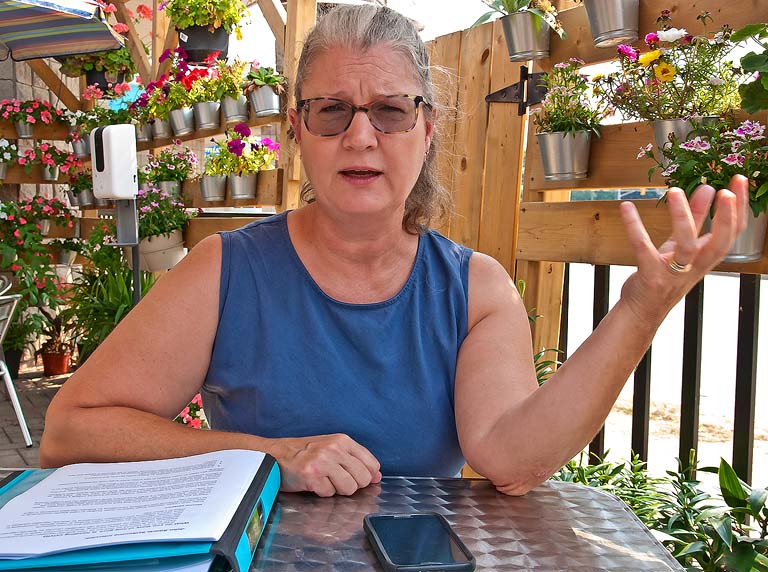
“Its (mental health) a medical health problem and it’s why we need an overhaul of medicare. It’s weird to call it medicare, it’s even called medicare on the federal government website. I think Canadians are not used to calling it that, it sounds very American. We absolutely need better mental health services. It’s very difficult to access mental health services. As a teacher, my own experience is with young students attempting to access mental health services and there are so many hoops to jump through for parents, for support people, for families who are trying to get mental health support and for people who themselves are going into hospitals and saying – I need mental health support. That needs to be re-funded. That has to be a bigger part of our medicare system,”
Creeping privatization is certainly an issue on Ontario, and a full-blown operational tactic in Alberta. Once upon a time the federal government told provinces if they wanted federal healthcare funding, toe the line on public ownership, provision and access, yet these two provinces are getting away with it now.
“They’ve even privatized some medical testing. There are certain medical tests that if you need, yes, you can get them in the hospital, but it’s a private clinic that’s doing the work,” Durnford said. Does that mean the feds should attach conditions to the transfers?
“Yes, because I think privatization is a huge threat, not only to health care but education as well. Our provincial government is trying to privatize education through the back door. I know that is a New Democratic policy too. Healthcare is a huge part of their platform; expanding healthcare and pharmacare and dental care. There absolutely needs to be, not just guidance, but formal, enforceable guidelines from the federal government for transfer payments. We are not socialist, but we are a social democracy and we are about looking after each other, caring for each other. That’s what Jagmeet Singh stands for. We need to be a community, we need to care for each other and part of that is healthcare.”
Abortion
This topic naturally flows from discussion about healthcare. Many Canadians thought it was settled and went away, but here we are with two parties bring it back to the headlines. Durnford is to the point and succinct with her opinion.
“Won’t happen, can’t happen. I am pro-choice. You won’t be an NDP candidate if you are not pro-choice. Same with vaccination, every candidate has to be fully vaccinated because these are things the party stands for and it has to be unequivocal.”
Media And The Internet
Part of the reason abortion as an issue is back is because some people can’t let go of their desire and will to impose their personal convictions on others. They are able to amplify their voice by use of social media, and like with COVID, often inflating or making up their arguments. Mainstream media has devolved into a clickbait standard of headline making and eyeball grabbing, so lame arguments on any topic get pushed into public
consciousness. Many are aware of the damage being done by a few and want some kind of regulation of the internet and a return to editorial standards which were once the rules of engagement. The trouble is no one has a clear idea how to do so. In the meantime many believe we are not being served by any method of communication for the masses.
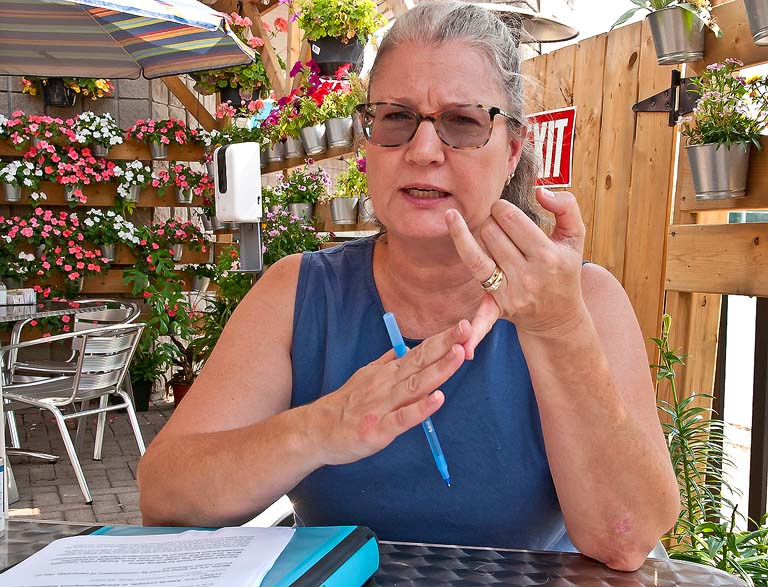
“We’re not. When the other side is lying, or not based in reality, which is more increasingly the case, I think some people don’t know they are lying. That’s a very challenging problem when it comes to social media. The social media companies have not taken leadership on that and that is something the CTRC should be enforcing and I know people will call it censorship.” Maybe as bad is what’s called paid media, or stories not produced by an organization themselves disguised advertising, or pushing an agenda.
“There is quite an overlap, even in media outlets I have some respect for, between advertising and stories, news, and a lot of consumers of media are not reading closely enough. I do appreciate the world is busy and people need consumable chunks of information, but there is also a place for those (media digging deeper). I’m an educator, so for me it comes down to media literacy and I believe that is something government could take leadership in. It is in the curriculum, but critical thinking itself is not in the curriculum and I think that is something adults too need to have some. I don’t know how you approach that, but we need to have better media literacy,” Durnford said.
“Even just today, as I was talking to people at the Farmers’ Market, they wanted to talk about vaccines. I talked to a surprising number of people who said – the vaccines are harmful, they’re killing people, they’re causing the variants; and someone said to me last night – don’t worry about that, that’s only 20% of the population. Even if it’s 20% of the population that’s appallingly high.”
Durnford thinks trying to figure why people fall for what many others detect as obvious baloney is maybe how to combat it.
“In a pandemic, in a time of uncertainty, I really grappled to understand why this misinformation was so appealing to people and I think people need certainty and the purveyors of misinformation present their information as certain, as opposed to science who says we need to test, we need to develop, we need to change, we learn as we go and people are assured certainty. There’s is also that appeal of having inside information; people say, oh the government is lying to us and I know the real story. That appeals to people,” she said.
“If we are going to combat that black and white thinking and that polarization, we need to understand it and it has to be research driven.”
“In the education system we’ve taught kids that things are either right or wrong. You spelled it wrong, or you didn’t. You got 50% on your math test, it’s either right or wrong, it doesn’t matter what process you used. I think that makes people crave certainty. They want to be right. Unfortunately, it’s the purveyors of misinformation that offer that. We see it when it comes to politics too. People throw around the terms fascism and communism and they don’t know what they mean and they don’t care they don’t know what they mean because they are using it for their own purposes. That’s not to say people are stupid. I think these are failures in education, failures in leadership. Is that a federal responsibility as opposed to provincial? I think it should be. There should be leadership at the federal level in how are we going to address – it’s not about censoring information, it’s about teaching critical thinking.”
Climate Change
One particular area society has suffered from misinformation is about climate change. Those who benefit from the status quo have spent money sowing denial it’s happening, creating confusion with the most of us who aren’t scientists, or scientifically literate. Durnford says the NDP has policy which is quite clear about where they stand and what they’ll do to speed moving away from oil for energy and building a new infrastructure for green energy production.
“Climate change is a huge part of the New Democratic Party’s policy. We are absolutely in a climate crisis. There is no question of that. It is challenging to have hope for the future and that’s why I am attracted to this policy personally. There’s a lot of focus on re-training for a green economy. We’re going to have to do it. Jobs are going to be lost to the climate crisis. We need to re-train the workforce so they are prepared for jobs that are more carbon neutral. We need to encourage electric vehicle. There’s lots of pros and cons,” she said.
So the time has passed for study and talk and now is time to take action while we can, even if it means making some mistakes along the way?
“Exactly. We do learn as we go along, but if we have a prepared workforce and this acceptance, acknowledgment that climate crisis is real and it needs to be a federal priority. Anything the federal government can do to shift the economy to a green economy, a carbon neutral economy, whatever you want to call it, it has to be a priority and it is a priority for the NDP,” she said.
As mentioned in other profiles, SUNonline/Orillia asked if it’s time for a national effort to do what we can to mitigate climate change, something akin to the effort Canada put into wartime production in the 1940s in order to get away from oil for energy and building a new infrastructure for green energy production.
“Yes, we do. (And) retrofitting buildings so they are not consuming much energy. That’s a huge one. That’s in our policy. That should be federally funded. They call it the National Crises Strategy. They talk about a Climate Corps, young workers. We don’t have time to waste. The climate crisis is now. It needs to be a major apriority of the federal government and they need to take leadership.
Preparing For Tomorrow
It always seems like our governments get caught with their pants down on a range of issues. Things many see coming catch politicians unaware and playing catch up – but only after we try everything else first. SUNonline/Orillia is asking every candidate if it’s time to create a ministry of preparedness, so things like pandemics, climate change, housing bubbles, rising healthcare costs, and pension fund deficits don’t catch us hustling to deal with issues decades in the making.
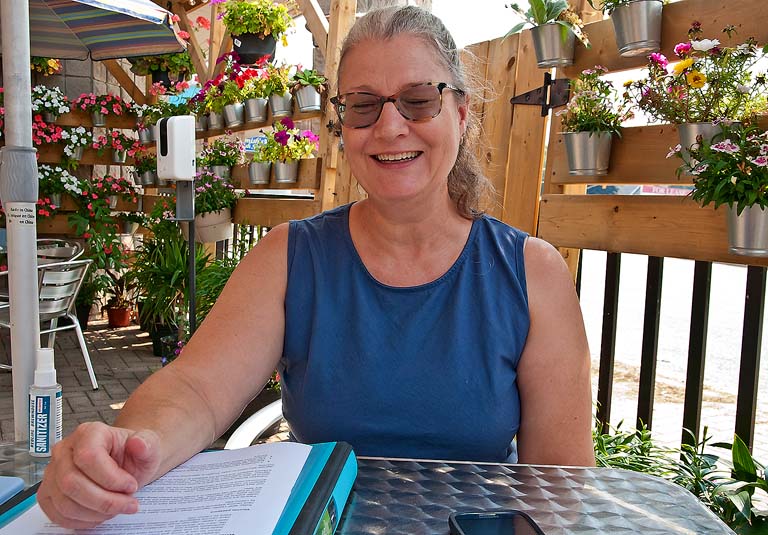
“That’s an interesting idea. You’re talking fiscal risks, economic risks, as well as health risks, risks in general? I’ve had a couple of these little things come up and I think, wow, it’s not in the policy document, but I wonder if that’s something that’s on the back burner. I’m going to find out. I would 100% advocate for that. It is such a good idea and it would prevent cancellation of essential research that happened under the former government – you know, lack of funding for pandemic preparedness, things like that. If it is a dedicated ministry, then it is protected from some of those cuts,” Durnford said. “It just makes sense.’
Another area we didn’t see coming, that we actually set up for ourselves is allowing the Chinese government such free reign to wreck our manufacturing sector, jack our housing costs beyond affordability, steal our industrial technical knowledge, make those things cheaper and cheaply – and then sell it back to us. This is on top of concerted effort to influence government decisions and academia. Is the NDP ready to stand up to the Chinese government?
“I hadn’t thought of it. It wasn’t a policy (I could find), so I asked. I’m going to read it to you because I think it’s good and I won’t say it as well, “A New Democratic government will stand up to China with a strong and coherent strategy to defend Canadian interests at home and abroad. We will work with our allies to lead a robust and coordinated international response to China’s disregard of the rule of law. New Democrats will call out human rights abuses by China, stand with Hong Kong pro-democracy asylum seekers, and provide coordinated support for those facing threats by Chinese entities here in Canada.””
This is the clearest, most direct approach any candidate or party has taken on relations with China yet.
The Last Word
As always, the candidate gets to bring up subjects not on the list. Durnford touched on housing above, but obviously believes it’s a major issue to do something about.
‘Affordable housing is critically important. I know so many people who are impacted by that. We need urgent action on affordable housing, we need more rental units. We need to facilitate first-time homebuyers being able to buy a house that’s affordable that isn’t going to risk their being able to buy food. We need rent controls. We need a registry of foreign buyers; that’s not a big issue, I don’t think, to my knowledge in this riding, but certainly in urban ridings, a lot of housing units are being bought up by foreign interests. That can’t happen. We need some understanding of who is buying and some controls on that, a registry of that.”
(Photos by Swartz – SUNonline/Orillia) Main: Simcoe North New Democratic Party candidate Janet-Lynne Durnford.
Support Independent Journalism
Previous Profiles:

